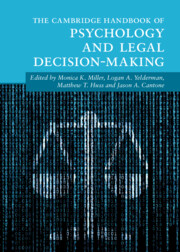Book contents
- The Cambridge Handbook of Psychology and Legal Decision-Making
- Cambridge Handbooks in Psychology
- The Cambridge Handbook of Psychology and Legal Decision-Making
- Copyright page
- Dedication
- Contents
- Figures
- Tables
- Editors
- Contributors
- Part I Introduction Chapters
- Part II Pretrial Phase Decision-Making
- Part III Trial Phase Decision-Making
- Part IV Postconviction Phase Decisions
- Part V Other Legal Decision-Making
- Part VI Perspectives from the Field
- 44 Culturally Competent Perspectives and a Legally Literate Practice Promote Quality Decisions in Social Work
- 45 Making Probation Decisions in the Real World
- 46 Justice for All
- 47 Police Officer Decisions in Interrogations and Investigations
- 48 Restoration
- 49 To Tell or Not To Tell: Is That The Question?
- 50 Diversity in Legal Decision-Making
- Part VII Conclusion
- Index
- References
48 - Restoration
The Sequel to Incompetency to Stand Trial
from Part VI - Perspectives from the Field
Published online by Cambridge University Press: 22 February 2024
- The Cambridge Handbook of Psychology and Legal Decision-Making
- Cambridge Handbooks in Psychology
- The Cambridge Handbook of Psychology and Legal Decision-Making
- Copyright page
- Dedication
- Contents
- Figures
- Tables
- Editors
- Contributors
- Part I Introduction Chapters
- Part II Pretrial Phase Decision-Making
- Part III Trial Phase Decision-Making
- Part IV Postconviction Phase Decisions
- Part V Other Legal Decision-Making
- Part VI Perspectives from the Field
- 44 Culturally Competent Perspectives and a Legally Literate Practice Promote Quality Decisions in Social Work
- 45 Making Probation Decisions in the Real World
- 46 Justice for All
- 47 Police Officer Decisions in Interrogations and Investigations
- 48 Restoration
- 49 To Tell or Not To Tell: Is That The Question?
- 50 Diversity in Legal Decision-Making
- Part VII Conclusion
- Index
- References
Summary
Once a defendant is deemed incompetent to stand trial (IST), the evaluator must indicate whether restoration can occur within the foreseeable future. This restoration must occur in a “reasonable” – but undefined – period. If restorable and the defendant is in the community, an outpatient restoration program might be utilized but only if the defendant does not constitute a physical threat to the community. If the defendant is incarcerated, the restoration process will likely occur in a secure hospital setting or a jail setting. Unfortunately, not every jurisdiction has an outpatient restoration program or a jail restoration program. The nature of the crime often creates what I call a “justice” bias toward competency or the restoration process. The more heinous the crime the more likely the defendant is to be competent or IST but restorable.
- Type
- Chapter
- Information
- The Cambridge Handbook of Psychology and Legal Decision-Making , pp. 696 - 701Publisher: Cambridge University PressPrint publication year: 2024



